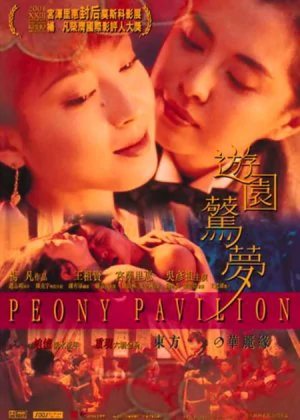Peony Pavilion
Yonfan's Peony Pavilion [You Yuan Jing Meng] was one of the films I came across relatively early in my exploration of Chinese cinema. It's been a good 15 years since I last watched the film and I admit that my recollection of the details was rather dim. Apart from it being pretty to look at and possibly being a bit more gender-bendy than your average Hong Kong film, I was drawing blanks. A good time to revisit this fun spin on a classic Chinese story. I hadn't really expected to fall in love with it all over again (as previous Yonfan rewatches were a tad disappointing), but this film won me over again pretty quickly.
![screencap of Peony Pavilion [You Yuan Jing Meng]](/thumbs/img/articles/1200xauto/peony-pavilion-1.webp)
Hong Kong cinema has been dominated by genre work since the early days. It's never been a very progressive haven, and it's always been relatively prude. Enter Yonfan, a director who started out doing simple genre fare, but quickly turned his back on commercial projects to take on more taboo topics. His work isn't all that confrontational or shocking, but it definitely stood out in the midst of all the other Hong Kong releases. Peony Pavilion is Yonfan at his very best, which makes it a good place to start for people unfamiliar with his work. It's an interesting take on an old romantic tale, told with lots of flair and gusto.
I have seen a few adaptations of the story before, but I'm not too familiar with it. It's safe to say though that Yonfan's version is quite the departure of the original. Maybe even to the point where you may wonder what the parallels are, but I'm sure those more versed in Chinese literature have a more in-depth opinion of that. Whereas the original story primarily dealt with an in-dream romance, Yonfan's version explores the relationship between two women who have a hard find keeping their regular romances going, and find comfort in each other's presence.
Ciu Hua is a former courtesan who eventually ended up marrying a nobleman. She lives in his mansion as his fifth wife, but she hardly sees him, and the house is struggling to keep its budget under control. Ciu befriends Lan, a cousin of her husband and a free spirit who teaches at a local school. The two become very close, but then Lan falls in love with a colleague of hers. A relationship that is doomed from the start, but keeps her away from Ciu. Even when they're apart, their bond remains strong, and when adversity hits, they are there to support each other.
![screencap of Peony Pavilion [You Yuan Jing Meng]](/thumbs/img/articles/1200xauto/peony-pavilion-2.webp)
Peony Pavilion is by far Yonfan's best-looking film. At times the cinematography reminded me of Christopher Doyle's work, but no other than Henry Chung was responsible for the film's very stylish look. He's not the most recognized or lauded cinematographer, but he really outdid himself with this one. Of course, the production design was pretty lush and served as a solid base, but the delicate camera work, the lovely use of colors and lighting, and the dreamy editing all add to the abundant visual flair. When your film looks like this, it's so much easier to get wrapped up in the story and the drama.
The soundtrack may be a tad more divisive, largely depending on your familiarity with traditional Chinese music (and whether you can stomach it). The music itself is pretty easy on the ears, but the singing is an acquired taste and there's quite a bit of that here. I'm not always a fan, but it actually worked relatively well and the music is an essential part of the film's stylistic signature. It's not music I'd put on and listen to outside of the film, but it helped to set the mood, and it got me in a romantic trance. I still wouldn't recommend everyone to crank up the volume, but I really liked the soundtrack.
As for the performances, Rie Miyazawa won an award for the part of Ciu Hua, and if you ask me, that was fully deserved. Her performance is mesmerizing, portraying a strong female character who still comes off as very vulnerable and loveable. Joey Wang holds her own next to Miyazawa and Daniel Wu delivers one of his better performances, but they can't take away the spotlight from Miyazawa's character. Hong Kong adepts may recognize Brigitte Lin as the narrator and may even recognize Yonfan himself in a cameo, but there's only one real star here, and that's Miyazawa.
![screencap of Peony Pavilion [You Yuan Jing Meng]](/thumbs/img/articles/1200xauto/peony-pavilion-3.webp)
The only real weakness I can point to is the structure of the story. Around halfway through the focus shifts from Miyazawa to the relationship that blossoms between Wang and Wu's characters. It's a necessary departure, but with such a strong investment in Miyazawa's role, it was difficult to see her character being fazed out for a while. I think it would've worked better if Wang and Wu's romance had been tighter integrated into the rest of the story, but ultimately this is only a small glitch that makes the middle part of the film slightly tougher than it needed to be.
If you want to familiarize yourself with the Peony Pavilion story, then this Yonfan adaptation probably isn't the best place to start, as it deviates quite a bit from the original. But if you want a love story set in early 20th-century China that subverts traditional gender roles, complemented by impeccable styling and stand-out performances, this should be your go-to film. Availability may be a little tricky, but that has never stopped determined fans of Asian cinema before. Peony Pavilion is my favorite Yonfan flick, an underappreciated little gem that deserves more exposure.
